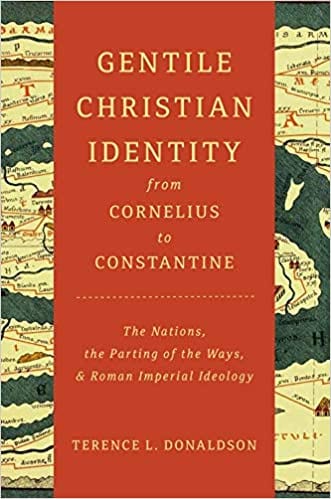Q. At the end of this stimulating book you suggest that Gentile Christians today should perhaps read themselves in light not of the Hebrews or the Jews in Scripture but rather by identifying with the Gentiles in the narrative. The problem with this suggestion is that Paul, our earliest NT witness encourages us to see ourselves, along with believing Jews as the children of Abraham. While I certainly agree that anti-Semitism is a grotesque sin that must be avoided, nor do I see this attitude as endorsed in any way in the NT, I do think that sometimes in trying to compensate for the ugly history of the church in its ongoing anti-Semitism we over-react to how we ought to read the Bible itself. While Gentile Christ followers should never have claimed to be Israel, a distinction Paul makes clear in Rom. 9-11 and perhaps also in Galatians, what Paul does say is that there is this new entity— Jew and Gentile united in the ekklesia of God, or put another way in the body of Christ, and that this is the final form of God’s people. So much is this the case, that Paul in Rom. 11 envisions a time when Christ the redeem will return from heaven and turn away the impiety of Jacob, and all Christ out of the picture, but quite specially by the action of the returning Christ himself. Thus the full number of Gentiles as Gentiles, as well as all Israel will be saved by Christ. Alan Segal I think was right in his fine book on Paul when he says Paul would have been seen by non-Christ following Jews as an apostate. This would likely have been just as true of the author of Hebrews, and Revelation and various other books in the NT. So I think at the end of the day Jews and Christians today just have to agree to disagree on some fundamental things but there are many things they can also agree on. Recently, my old friend A.J Levine and I published the first ever commentary on a Christian Gospel (namely Luke) done by a practicing Jew and practicing Gentile together. It was a great 10 year process which resulted in excellent respectful dialogue, with a good deal of agreements and also not infrequent disagreements while still be very good friends. I would be very glad to hear your closing reflections on these last two paragraphs.
A. For the most part, this book is a historical study of a particular development in the life of the early Christian movement, a development that culminated in the emergence of what became the dominant form of the church, especially in the so-called Western world. In a short Afterword, however, I do engage in some reflections about the significance of this process of development for the church in our own day. It is in this context that I make the suggestion that contemporary Christians, identifiably gentile for the most part, have things to learn by incorporating this identity into their reading of scripture—that is, reading scripture by aligning themselves with the nations/gentiles in the unfolding narrative of Israel and the Jewish people, rather than with Israel itself. I make this suggestion as a heuristic reading strategy rather than as part of any thoroughgoing theological project (e.g., to redefine the character or identity of the church). I readily admit that I need to do some more thinking about this myself—what such a reading strategy would look like and what things might be learned by carrying it out.
Now I certainly recognize that the New Testament contains material supportive of the idea that, by virtue of their faith in Christ and membership in the church, gentile believers can see themselves as sharing in the identity of Israel. You mention one example—Paul’s statements that gentile believers are children of Abraham. Actually, Paul’s statements in Gal 3:29 and Rom 4:16 are even stronger: believing gentiles are part of Abraham’s seed (sperma), a term that Paul draws from Gen 17 (a passage cited explicitly in Rom 4:17), where it is used to identify (circumcised) members of Abraham’s covenant family, who are thereby explicitly differentiated from the nations who can also call Abraham father. And other examples can be adduced: Paul’s assumption that the Corinthian believers (who used to be ethnē; 1 Cor 12:2) can now think of the Israelites as their “fathers” (10:1); in 1 Peter 2:9 the use of Israel-specific identity phrases with reference to gentile believers; and so on. So I’m certainly not overlooking or de-legitimizing this aspect of NT identity construction.













